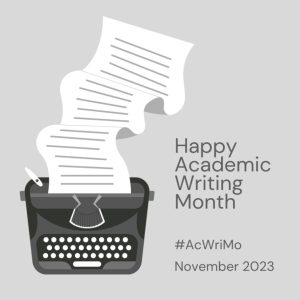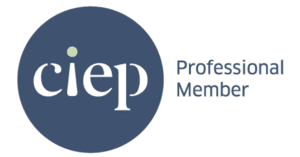Academic Writing Month, commonly known as AcWriMo, is an ideal opportunity for authors to enhance their manuscripts. You can harness their creativity during this dedicated period and join a supportive community. Moreover, AcWriMo enables you to adhere to writing schedules and achieve your manuscript goals effectively. Additionally, the collaborative spirit and available resources make it an excellent time to receive feedback, make substantial progress and, most importantly, ensure a polished manuscript is ready for publication.
The motivation and accountability within the AcWriMo community encourage you to stay on track, while the shared experiences and expertise lead to improved writing quality. It is the perfect time to harness your creativity, receive valuable feedback, and make substantial progress toward producing a polished manuscript ready for publication, all within a supportive and inspiring environment.
This article explains what AcWriMo is, its origins, evolution and how to leverage AcWriMo to write an academic book successfully.
- What is AcWriMo?
- How did AcWriMo start?
- Who can participate in AcWriMo?
- How to join and celebrate AcWriMo?
- How to succeed during AcWriMo?
- What are the next steps after AcWriMo?
What is AcWriMo?
Academic Writing Month, or AcWriMo, is a significant event in an author’s life. This dedicated month, annually, provides a unique opportunity to hone your writing skills and advance your manuscript preparation. The primary objective of AcWriMo is to encourage you to focus on your academic and creative writing projects with dedication and enthusiasm. It is a time to set specific writing goals, establish a writing routine and make substantial progress in your manuscript.
By participating in AcWriMo, you can boost your productivity and enhance the quality of your work. It is a platform where you can engage with a community of like-minded writers, exchange ideas and receive valuable feedback to improve your manuscript. This collaborative and supportive environment fosters a sense of accountability, which can be instrumental in ensuring that your book is well-prepared for publication. While writing is solitary, AcWriMo offers the motivation, structure and peer support needed to perfect your manuscript.
How did AcWriMo start?
Academic Writing Month, known as AcWriMo, emerged in 2011 as a response to the academic community’s need for a similar initiative that could facilitate and motivate scholarly writing. Charlotte Frost, the founder and director of PhD2Published, initiated AcWriMo to encourage academics, researchers and students to focus on their academic writing projects during November. AcWriMo journey AcWriMo was initially named AcBoWriMo (Academic Book Writing Month), and the critical idea behind it was to help academics and self-publishing authors set writing goals, establish dedicated writing routines and gain peer support. After a successful first month of academic writing, the community transitioned to the #AcWri hashtag to maintain a focused platform for discussions on academic writing. Today, AcWriMo thrives, empowering writers to make substantial progress in their academic research, theses and manuscripts.

Who can participate in AcWriMo?
The beauty of AcWriMo lies in its versatility. It caters to novice and experienced writers, allowing everyone to engage in various writing activities. This goes from outlining and drafting to revising and editing. As for the self-publishing authors, the editing phase is particularly crucial. This is because it significantly influences the final quality of their books. This is where the guidance of a professional editor becomes invaluable.
Professional editors possess the expertise to identify and rectify your manuscript’s grammatical, structural and stylistic issues. Their keen eye for detail ensures that your book is free from errors, making it more appealing to your readers. Partnering with a professional editor during and after AcWriMo can be a game-changer in your self-publishing journey. It elevates your manuscript’s quality and streamlines the publishing process, ultimately saving you time and effort.
How to join AcWriMo?
AcWriMo offers a unique opportunity to join and turbocharge your writing efforts. Here is a list of steps to successfully finish an academic book manuscript during AcWriMo.
# 1 Define your writing goal
Before embarking on your AcWriMo journey, setting a clear and achievable writing goal is crucial. You can count words, hours invested or projects to be completed — it is your choice. However, challenging yourself can lead to more significant accomplishments. Your goal should be both motivating and attainable.
#2 Publicly declare your goal during AcWriMo
Accountability is a cornerstone of success during AcWriMo. By publicly declaring your goal, you create a sense of pressure that can drive your progress. Sharing your commitment with fellow writers, whether on Twitter using the #AcWriMo hashtag, Facebook or your blog, can be a powerful motivator.
#3 Draft a strategy
Effective planning and preparation are critical to a successful AcWriMo experience. For instance, prepare in advance by researching and carving out dedicated time slots in your schedule for writing. Ensure you have all the necessary tools and resources, and remember your favourite coffee or other writing essentials.
#4 Keep the community updated
Share your progress, what is working well and any challenges you face with other academic writers. The AcWriMo community is supportive and can provide valuable insights. Rememebr to tag it with the #AcWriMo hashtag.
#5 Stay committed during AcWriMo
As participant Bettina suggested, during AcWriMo, you must ‘write like there’s no December.’ Push yourself to discover the most effective techniques for your writing process. The determination you cultivate during this intense month will benefit you long-term.
#6 Declare your achievements
At the end of the month, you announce your results. Whether you use a daily spreadsheet or provide a summary, sharing your accomplishments and challenges contributes to the supportive AcWriMo community.
How to succeed during AcWriMo?
AcWriMo is not just about hitting word counts. Instead, it is about celebrating the joy of writing, improving your craft and sharing your research and expertise with the world. Here are some ideas of how you can make the writing process easier and with more attainable goals.
#1 Set meaningful goals during AcWriMo
The essence of AcWriMo is setting and achieving writing goals. Define what success looks like for you. Clear goals provide direction, whether completing a novel, finishing a research paper or editing your manuscript.
#2 Connect with fellow writers
Use social media, especially the #AcWriMo hashtag on X (Twitter), to connect with a global community of writers. Share your progress, ask for advice and celebrate each other’s achievements. Writing can be solitary, but during AcWriMo, you are part of a supportive network.
#3 Create a writing sanctuary during AcWriMo
Designate a comfortable and inspiring writing space. Surround yourself with books, inspirational quotes and your favourite beverages. A dedicated space can boost productivity and motivation.
#4 Develop a writing routine
Consistency is key. Establish a writing routine that suits your lifestyle. Whether a night owl or an early bird, set aside dedicated writing hours. Stick to your schedule, but also allow room for flexibility.
#4 Take breaks and recharge
Writing marathons are great, but remember to take breaks. Step outside, breathe in the fresh air and recharge. A rejuvenated mind is more creative and productive. To achieve your goals, you need to take care of yourself.
#5 Reflect and edit
Celebrate the revision process. Reflect and edit your work after achieving your word count or completing a project. Self-editing is valuable, but consider hiring a professional editor to refine your writing further.
At the final stages of the manuscript, professional editing can improve the quality of the writing, ensuring that it is clear, concise and coherent. It can also help identify and eliminate grammatical errors, punctuation errors and spelling errors, ensuring that the manuscript is error-free. If you need this type of help, consider proofreading or copyediting.
At earlier writing stages, professional editing can help identify areas where the writer needs to focus, such as clarity, structure or content. Furthermore, it can help writers refine their ideas, organise their thoughts and ensure that their message is clear. A professional developmental editor can help refine your academic manuscript at this stage. Finally, professional editing can help writers avoid common mistakes and improve readability, such as repeating ideas and using passive voice or jargon. In such case, line editing may be a helpful service.
What are the next steps after AcWriMo?
After completing AcWriMo, the next step for many academic writers is to publish the books they wrote during AcWriMo. Academic book publishing is significant in disseminating scholarly research, and publishing a book is often a crucial milestone in an academic’s career.
Academic publishers generally comprise two main types: university presses and for-profit (commercial) publishers. University presses focus on niche subjects and contribute to the intellectual reputation of the affiliated university, while for-profit publishers have a broad portfolio and publish for academic and general audiences.
The publishing process for an academic book typically involves nine steps, including peer review and production. When an author submits a book manuscript, the publisher sends it for review. Next, the author may be asked to address the feedback provided by the reviewers. Then, the manuscript undergoes editing, design and layout and indexing. Finally, it is printed and distributed to bookstores, while marketing activities promote its launch and sales.
Editing plays a crucial role in preparing an academic book manuscript for publishing. Professional copyeditors and proofreaders ensure that the manuscript meets professional standards, is clear and coherent and adheres to the conventions of academic writing.
In turn, indexing, a critical phase in academic book publishing, is a specialised service that adds significant value to scholarly work, providing clarity and organisation to the manuscript. This process involves strategically arranging key terms, concepts and references to offer readers a structured roadmap through the academic content.
Choosing the right academic publisher for an academic book is a crucial decision that can impact the work’s visibility, reach and impact. Some considerations for selecting a publisher for an academic book include reputation, specialisations, editorial support, contract terms, author’s rights, and market reach.
Final thoughts
In conclusion, AcWriMo is an excellent opportunity for authors, researchers and students to enhance their writing skills, gain peer support and achieve their manuscript goals. It provides a structured and supportive environment that fosters creativity, collaboration and accountability, making it easier to produce a polished manuscript ready for publication. By participating in AcWriMo, writers can improve their writing quality, productivity and overall manuscript preparation. So, take advantage of this unique opportunity and join the community of writers striving to perfect their manuscripts, one word at a time.
Finding the right editor may take you closer to creating a high-quality academic publication. Considering your manuscript’s needs, checking the editor’s experience, credentials and professionals, evaluating the sample edit, and establishing project terms will all contribute to choosing an editor for self-publishing success. However, if you still need clarification, here are some ideas for additional questions to ask when hiring an editor. You can also ask me for a free sample edit (and remember to use my early bird discount). If you want to hear more from me, including self-editing and writing tips, follow me on Mastodon, Twitter, Facebook and LinkedIn, or join my newsletter.


